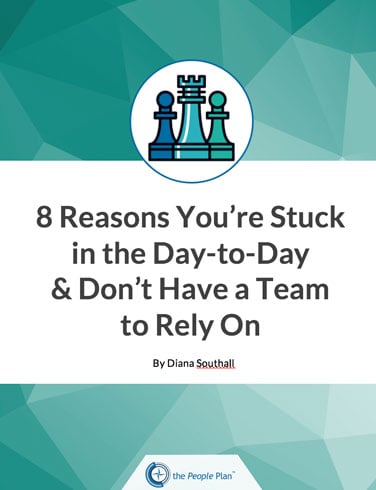
by Diana Southall | Oct 6, 2015 | coaching, culture, job fit, performance
Many organizations realize that “prior job experience” is only one element that determines success in a job role.
Since 82% of managers are in the wrong job— mid-size and large employers are looking toward other indicators to use for selection, career paths, training and development.
(more…)

by Diana Southall | Sep 15, 2015 | culture, performance
A client was mentioning his frustration with a fairly new employee, when these words were uttered “He seems disorganized, after one year.“
This person had 5 years of experience in a similar role and was hired with high expectations to come onboard, quickly learn the job, and start taking on more client work and responsibility to free up the owner’s time.
But you may have been in this situation before.
The person takes a bit more time than expected to “learn” the job (or at least your systems and procedures). And he does the activities of the job adequately, but doesn’t achieve the results you expected. Or take on a larger role or more responsibility that you would like.
So you spend more time monitoring and coordinating work, and feel like you still can’t delegate anything off your to-do list.
He is a stable employee in the role but the growth and impact is not what you wanted at one year.
So you are questioning the root cause of the performance gap:
- Are the expectations clear?
- Does this person want the role I thought I hired him for?
- Will training help?
- Is this even the right person?
This is a challenge for even the most seasoned People Coach.
To uncover the true cause of the gap between what an employee is doing and what you expect in the role, you need to “evaluate for job fit.”
To assist in this detective work, I have created an article and template to guide you.
Download the “Job Fit Performance Maximizer” here.

by Diana Southall | Aug 7, 2015 | action plans, coaching, culture
A new software for small business owners is called “17 hats” – and I think this accurately reflects the roles of a small business owner. You are chief everything officer (sales, people, operations, marketing, accounting, customer service), cheerleader and spokesperson, and as my family says “chief bottlewasher!” (if it needs to get done, you will do it.)
So it is no wonder you feel like you don’t have time to coach your team members monthly (much less weekly).
And no doubt some people on your team are easier to coach than others, so you tend to procrastinate in delivering feedback or talking about what would challenge and motivate them.
The data is clear—employees don’t just want daily task discussions (called “Managing by Wandering Around” by Tom Peters)—
Employees want to know how they can contribute, what is the purpose of their work, feedback on results, and that there are opportunities to develop and maximize their strengths at your organization.
This means you need a development plan for each person, coupled with regular two-way discussion on their aspirations and challenging assignments that meet their desired career path. (That is what we mean when we say “coaching.”)
If all of your conversations center around “what are you working on today” then they feel ignored, and will lose interest, commitment, and engagement in your job. (Reminds me of the joke – “I feel like a mushroom, left in the dark and fed manure.”)
Ultimately these unnoticed people will seek employment elsewhere where they can feel appreciated, a sense of accomplishment and contribution.
Or worse, stay in your job as “actively disengaged” working against your team. (Read my article—Want Employees to Tune Out? Ignore Them to find out the huge cost of the disengaged).
Every small business owner or manager can be a motivational, positive, and appreciative leader and implement a rhythm of weekly coaching conversations.
You just need a blueprint and training, and the willingness to learn and get outside your comfort zone to start having real conversations with your staff.

by Diana Southall | Jul 21, 2015 | action plans, coaching, culture
The average manager has 2-3 weeks of paid vacation each year, but most do not use every day off.
Time Magazine cover article for the 6/1/15 edition asked “Who Killed Summer Vacation?”
In fact, this has become so prevalent, there is a commercial featuring kids asking “can we just have one more day?” Pretty heartbreaking!
Do we love our jobs so much that we can’t possibly get away for 5 days at a time? Or are we creating conditions at the office where our teams and colleagues can’t function without our genius and brilliance?
I have a global client with multiple locations in Europe. Last summer we were working on a high priority sales compensation project. I was struck by the attitude of the sales manager from France and the regional operations Director in the UK. They simply mentioned “I am on holiday those two weeks (or month)”—no apologies, no offer to call into the meeting from the beach. And somehow their divisions seemed to survive the summer, and re-emerge in the fall with plenty accomplished.
If you own the company, you truly have no excuse.
What are you doing that can’t wait 5 days?
Who can you train to make decisions while you are gone?
My mother’s wisdom applies here – she used to say “I became a manager when I opened my second store. I had to put systems and people in place, since I couldn’t be there to handle everything.”
What can you do? I say book a 10 day cruise or vacation without email or phone access, and prepare as best you can. Then leave! You would be surprised by how your team can “hold down the fort” without you.
(In fact, have everyone keep a list of things they normally would have discussed with you, but they somehow figured out … then add these things to your training plan for next quarter).
Need some tips for taking charge of your schedule?:
Read my article about how delegation actually leads to more engagement: Engagement Driver 4- Training and Development
Entrepreneur Magazine article- 12 Habits for a Better Work-Life Balance

by Diana Southall | Jul 7, 2015 | culture, job fit
Perhaps you are you frustrated by a poor performer, so you avoid her as much as possible (you don’t want to be mean.)
Or you are getting tired of mentioning the same instructions to the new employee, so you have stopped giving him guidance at all.
Or you are “too busy” putting out fires and responding to urgent requests, so you have little contact with your staff other than the hallway.
After all, your employees should know their jobs and should know the company’s goals, so why do you have to keep reminding them?
Ignoring your team members is actually 20x worse than being a critical boss!
In fact, a recent study of employees found that of employees who feel ignored by their direct manager only 2% reported being engaged with their job, compared to 45% of employees who report their boss focused on their weaknesses, and 65% of those with a positive focused manager.
Almost half of these “invisible” team members reported to be “actively disengaged” – meaning that they consciously perform lower – versus 1% of those with positive managers.
Seriously, if you are not coaching your team then they are like a boat without a captain—sailing towards the horizon with no particular place to go. (I just watched Pirates of the Caribbean again- what a fun study in leadership!)
To be effective, team members need to be
Still worried about coming off as mean or critical?
The data is pretty clear—even the negative manager has about half his team pulling in the right direction. This is a huge improvement from 45% pulling in the wrong direction when they are ignored!
So definitely work on your own development to be a positive focused manager, but don’t be afraid to start talking to your team. (See our video training for a simple system to do just that.)
{Graph from Zenger Folkman “Extraordinary Leader” webinar series}

by Diana Southall | Jun 16, 2015 | action plans, coaching, culture, job fit, performance
Zenger Folkman report that employees who are the most satisfied and committed work for leaders who do 4 crucial “behaviors that focus on achieving challenging goals”
- Inspire them to high levels of effort
- Energize them to achieve exceptional results
- Create an atmosphere of continual improvement
- Skillful at getting them to stretch for goals that go beyond what they originally thoughts was possible
BAM- that sounds like a recipe for some high performing work!
To put it another way:
- These managers have a People Plan for each person with mutually beneficial projects and work that are designed to be challenging.
- This “stretch” work naturally develops the team member, and keeps her energized and inspired (and doing her best work).
- Employees feels that “the company provides excellent learning and growth opportunities for my own development.” (This is the key to keeping employees from looking for another job.)
- The positive coaching provided by the manager creates a team culture to perform at a high level, and this positive “peer pressure” continually reinforces the positive behaviors and outcomes.
This is the magic atmosphere where employees are engaged… performing with discretionary extra effort.
The most successful employers have 70-80% engaged employees, the worst 10-20%.
What if 7x more employees were terrific at their job- would that make a different to your team atmosphere and achievement?
If you want your department, your location, your organization to succeed- the key is managers who can positive coach and challenge the team to outperform every day.









